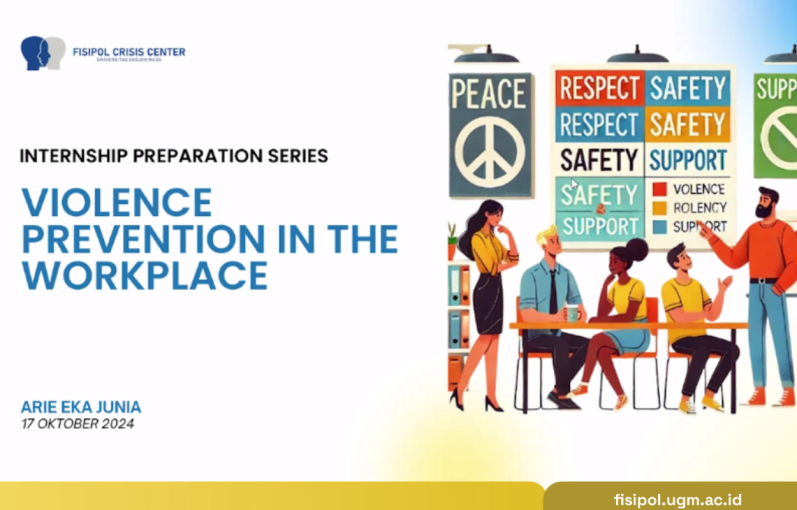
Yogyakarta, October 17th 2024─Opportunities for students to do an internship or work either part-time or full-time are now increasingly wide open. Many offers are given both by companies and the Ministry of Research and Technology, especially through the MBKM program which facilitates students to learn in the work environment directly. Responding to this phenomenon, Career Development Center (CDC) Fisipol UGM held another Internship Preparation Series with the theme “Work Ethics and Violence Prevention: Meaning and Implementation”.
The webinar, which was held online on Thursday (17/10), was a collaboration between CDC Fisipol UGM and Glints Indonesia. Through this event, it is expected to be able to provide in-depth understanding to the participants of the activity regarding the importance of upholding work ethics and various forms of violence in the work environment.
Hadea Dinullah, Senior People Operations Associate at Glints Indonesia as the first speaker in this webinar brought material about internship ethics. Hadea underlined the importance of understanding company culture for both employees and interns as a foundation for being ethical at work. “To apply work ethics, we need to first understand company culture, an organizational value or behavior that is expected to be reflected by its employees and of course every company has a different culture,” he said.
Hadea also gave advice on how to be a good intern. He said that there are at least four things that good interns must have, namely applying a beginner mindset, taking initiative (self-driven), contributing to the system, and realizing mistakes and always learning from them. “It is always normal for interns to make mistakes, take advantage of that benefit, if, for example, friends make mistakes, admit it, explain it, and ask for help to solve the problem,” he concluded.
The next session was presented by Arie Eka Junia, FCC Fisipol UGM who discussed the prevention of violence in the workplace. She showed data from the ILO which shows that 70.93% of workers in Indonesia have experienced various forms of violence. There is a lot of violence that can occur in the work environment ranging from physical, psychological, sexual, and economic violence.
As part of the Faculty of Social and Political Sciences UGM that focuses on handling sexual violence, FCC underlines the importance of preventing sexual violence in the work environment. Arie explained that sexual violence in the work environment can occur due to unequal gender power relations and acts of exceeding consent that can occur physically, non-physically, verbally, or through information and communication technology.
Arie shared three ways that can be done to reduce the risk of becoming a victim of sexual violence. First, dare to say no politely and firmly if you don’t want to be involved in certain activities. Second, always communicate personal boundaries such as home time and privacy clearly and politely. Third, trust your instincts. “If for example there is an activity or place where you don’t feel safe, leave immediately, don’t wait for something to happen,” she said.
Arie also said that if you become a victim of sexual violence, you should never blame yourself. She also recommends telling the sexual violence to a trusted person or professional as a support system. Finally, she also recommends keeping all available evidence to report to the nearest sexual violence handling agency. “Have the courage to report the sexual violence experienced to the nearest sexual violence handling institution, it doesn’t have to be far away, find a close one that you trust,” she said.
Not to forget, Arie reminded us to always be an active bystander if violence occurs around us. Being an active bystander can be done through 5D, namely direct, distract, delegate, document, and delay.
With this webinar, it is hoped that students will be able to understand ethics in the world of work and prevent various forms of violence. That way, the 5th point of sustainable development goals on gender equality and the 8th point on decent work and economic growth.
